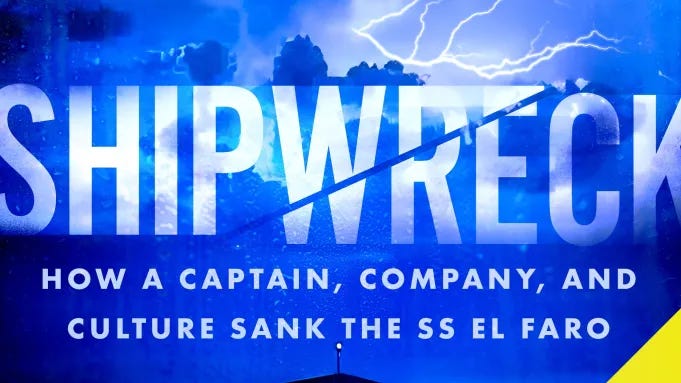Shipwreck: Uncovering the Truth Behind the SS El Faro Tragedy
On October 1, 2015, the SS El Faro vanished in the middle of Hurricane Joaquin near the Bahamas. Thirty-three crew members were on board. None survived. In the days that followed, only scattered debris surfaced—an orange life ring, a few empty survival suits, a cracked lifeboat—but no answers. How did a modern American cargo vessel, equipped with satellite weather technology and decades of sea experience among its crew, steam straight into a deadly Category 3 hurricane? Were catastrophic errors made? Was pressure placed on the captain and crew that led them into danger? Or is the real story buried beneath the surface of corporate silence and the unforgiving Atlantic?
Maeve McGoran’s Audible Original podcast Shipwreck is not just a retelling of the disaster—it is a relentless, gripping investigation into why it happened. It is not driven by sensationalism but by a deep pursuit of truth. Meticulously researched and hauntingly told, Shipwreck stands as one of the most compelling investigative audio series in recent years, and a necessary examination of one of the most preventable maritime tragedies in modern history.
Into the Eye of the Storm
In the early morning darkness of September 29, 2015, the El Faro steamed out of Jacksonville, Florida, en route to Puerto Rico. The weather reports were already tracking what would soon become Hurricane Joaquin. There were warning signs—many of them—but the ship continued forward on schedule. This decision would prove fatal.
McGoran reconstructs the journey in gripping, minute-by-minute detail, drawing from witness testimony, National Transportation Safety Board (NTSB) findings, and one of the most chilling pieces of evidence ever recovered from a shipwreck: the vessel’s voyage data recorder (VDR), or what most people know as the “black box.”
While most maritime black boxes capture only technical data, the one aboard the El Faro recorded 26 hours of audio from the bridge. That means the final hours of the crew—their discussions, their plans, their fears—were preserved. Even more unsettling, their frustration at not being able to escape the storm is audible. The decisions that led to those final moments are now part of the record. Shipwreck does not exploit this audio; it treats it with gravity. But it uses it to peel back a difficult truth: this tragedy should not have happened.
The Central Questions
Rather than rehash the entire timeline, Shipwreck asks the deeper questions that linger nearly a decade later:
Why did the ship depart despite storm warnings?
Why did it stay on course instead of diverting like other vessels in the same region?
Was economic pressure placed on the crew to maintain schedule at the expense of safety?
What mechanical failures crippled the ship at the worst possible moment?
Why were outdated open lifeboats—nearly impossible to survive in—still allowed on board?
And perhaps most disturbingly: Why was accountability so hard to find?
These questions pull listeners into the heart of the investigation. McGoran doesn’t settle for surface-level explanations. She investigates not just the sinking—but the decision-making system behind it.
A Layered Investigation
Shipwreck is structured like a gradual descent into the truth. Each episode unravels another layer: corporate protocol, crew communication, weather data, Coast Guard regulations, emergency response, and the failed search attempts. The investigation extends far beyond the ship itself. McGoran examines the culture of commercial shipping—an industry where deadlines and profit margins can quietly overshadow caution.
She explores the regulatory loopholes that allowed older vessels like the El Faro to keep sailing long past their prime. Listeners learn about “grandfather clauses,” outdated safety standards, rusted infrastructure, and the frightening vulnerability of merchant mariners—many of whom work long hours in silence, far from public view, trusting that those in charge will prioritize their safety. In the case of the El Faro, that trust was shattered.
The Black Box: Voices From the Final Hours
The most harrowing part of Shipwreck is the reconstruction of the final hours aboard the El Faro. When the ship lost propulsion near the storm’s center, it became helpless, rolling violently in hurricane-force winds. Water began flooding the cargo hold. Communication systems were strained. Mayday calls went out. Those on board fought for their lives.
McGoran handles these moments with exceptional care. When she references the recovered audio, she does so with restraint. She doesn’t replay dialogue for effect—she analyzes it to reveal truth. The recording shows the tragic convergence of human decision-making, mechanical failure, and unstoppable weather. It shows fear, urgency, confusion—and ultimately resignation.
And yet, perhaps the most frustrating revelation of all is how long it took federal investigators to even locate the wreck. Despite its last known coordinates, the search dragged on before finally uncovering the shattered ship 15,000 feet below the surface.
A Lens of Precision and Respect
One of the most compelling strengths of Shipwreck is McGoran’s unique storytelling balance. She is investigative but never accusatory. She is emotional but not sentimental. She is factual without being cold. Her research is thorough, yet she never loses sight of the human element.
This is a difficult story to tell without leaning into blame or dramatization. Lesser productions might sensationalize the storm or vilify individuals. Shipwreck refuses that approach. It respects the complexity of events and focuses on accountability, not accusation. It extends empathy to everyone involved, from the bridge crew to the search teams to those who tried—too late—to alter the course of disaster.
Gripping Audio Production
The production of Shipwreck is as strong as its content. The audio design is atmospheric without being intrusive. Listeners feel the isolation of open sea and the mounting urgency of a ship in peril. The pacing is excellent—tight when it needs to be, spacious where silence allows reflection.
There are no gimmicks here. No unnecessary sound effects and no artificial tension. Just authentic storytelling, supported by real interviews, real documents, and real consequences.
Why Shipwreck Matters
This is not just a maritime story. It is not just a corporate negligence story. It is a story about something bigger—the cost of unanswered questions.
The SS El Faro didn’t simply sink. It exposed vulnerabilities in a system that millions of shipping employees still work within today. It challenged blind trust in leadership. It forced government agencies to confront serious maritime safety failures. It sparked lawsuits, congressional hearings, and policy reforms.
And still—questions remain unanswered.
Who ultimately allowed this voyage to continue despite the risk? Why were distress signals delayed? Why did the life-saving equipment fail? Why were emergency protocols ignored or insufficient? Why did so many safeguards fail at once?
Shipwreck brings these unresolved questions back into the light and refuses to let them drown in the depths of bureaucracy.
A Five-Star Investigation
Maeve McGoran has created more than a podcast. She has created a permanent record of inquiry—one that refuses to accept silence or corporate statements as truth. Her storytelling honors the devastation of the El Faro without exploiting it. She brings listeners into an investigation that many have never heard—and ensures they will never forget.
This is not entertainment. This is truth-seeking.
And that is what makes Shipwreck a five-star achievement in investigative storytelling. It holds power. It holds weight. It holds history accountable.












